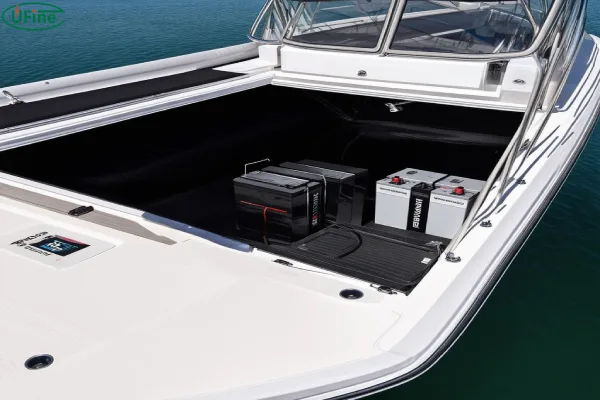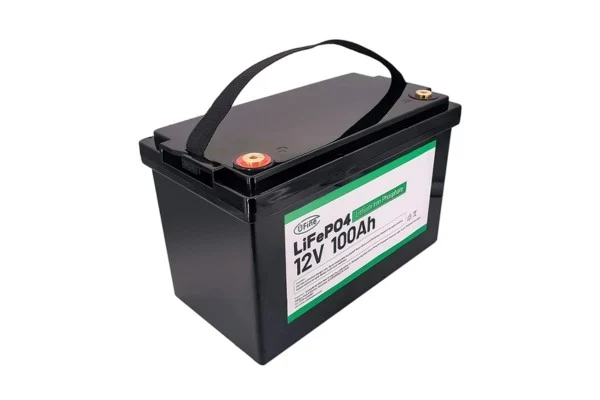Are you ready to embark on a journey through the exciting world of lithium boat batteries? Whether you’re a seasoned sailor or a weekend warrior, understanding the ins and outs of these powerful energy sources can make a world of difference in your maritime adventures. In this comprehensive guide, we’ll dive deep into the realm of lithium boat batteries, exploring their inner workings, advantages, and everything you need to know to make an informed decision for your vessel. From voltage considerations to maintenance tips, we’ve got you covered.
Part 1. Lithium boat batteries overview
Lithium boat batteries are the new kids on the dock, revolutionizing the way we power our marine vessels. But what exactly are they? Well, imagine a powerhouse that’s lighter, more efficient, and longer-lasting than traditional lead-acid batteries – that’s your lithium boat battery in a nutshell!
AGM VS Lithium VS Lead-Acid Battery: Comprehensive Comparison
These batteries are based on lithium-ion chemistry, similar to what you’d find in your smartphone or laptop, but beefed up for marine use. The secret sauce lies in their ability to pack a lot of energy into a compact, lightweight package. Inside, you’ll find a positive electrode (cathode), a negative electrode (anode), and an electrolyte that allows ions to move between them. When you’re using the battery, lithium ions flow from the anode to the cathode, releasing energy. When you’re charging, the process reverses.
The structure of a lithium boat battery typically includes multiple cells connected in series or parallel to achieve the desired voltage and capacity. Each cell is carefully sealed to protect against moisture – after all, boats and water go hand in hand!
Part 2. Lithium boat battery voltage
When it comes to voltage, lithium boat batteries are like the Goldilocks of the marine world – not too high, not too low, but just right! The most common voltage you’ll encounter is 12 volts, which is perfect for powering most of your onboard electronics and systems.
But here’s where it gets interesting: while lead-acid batteries provide 12 volts nominally, their actual voltage can drop significantly during use. Lithium batteries, on the other hand, maintain a steady voltage throughout their discharge cycle. This means your equipment gets consistent power, whether you’re starting your day on the water or winding down after a long cruise.
Some larger boats or more power-hungry setups might use 24-volt or even 48-volt systems. These higher voltages are great for running bigger motors, air conditioning units, or other energy-intensive appliances. But don’t worry – with the right setup, you can still use 12-volt equipment on these higher voltage systems.
Part 3. Advantages and disadvantages
Let’s weigh anchor and explore the pros and cons of lithium boat batteries:
Advantages:
- Lightweight: They’re like feathers compared to lead-acid batteries, making your boat lighter and more fuel-efficient.
- Long-lasting: These batteries can handle thousands of charge cycles, outliving traditional batteries by years.
- Faster charging: You’ll spend less time at the dock and more time on the water.
- Consistent power output: Say goodbye to voltage sag during high-demand situations.
- Depth of discharge: You can use up to 80% of the battery’s capacity without damaging it.
- Low self-discharge: They hold their charge better when not in use.
Disadvantages:
- Higher upfront cost: They’re pricier than lead-acid batteries, but the long-term savings often justify the investment.
- Sensitivity to extreme temperatures: They don’t like it too hot or too cold.
- Potential fire risk: While rare, lithium batteries can be a fire hazard if damaged or improperly managed.
- Specialized chargers required: You can’t use your old lead-acid charger with these high-tech batteries.
Part 4. How long do lithium boat batteries last?
Ah, the million-dollar question! Well, get ready for some good news. Lithium boat batteries are the marathon runners of the battery world. While a typical lead-acid battery might give you 500-1000 cycles, a quality lithium battery can deliver a whopping 3000-5000 cycles or more!
In real-world terms, this could mean 10-15 years of reliable service, depending on how often you use your boat and how well you treat your batteries. Of course, like any piece of equipment, their lifespan can vary based on factors such as usage patterns, charging habits, and environmental conditions.
Part 5. Maintenance
Here’s another reason to love lithium boat batteries – they’re low-maintenance divas! Unlike their lead-acid cousins, they don’t need you fussing over them constantly. However, a little TLC goes a long way:
- Keep them clean and dry: A quick wipe-down now and then is all they need.
- Avoid extreme temperatures: Store your boat in a temperature-controlled environment when possible.
- Use the right charger: Always use a charger designed for lithium batteries.
- Don’t let them sit empty: If you’re storing your boat for a while, leave the batteries partially charged.
- Regular checks: Inspect the batteries and connections periodically for any signs of damage or corrosion.
Part 6. How to choose the right lithium boat batteries?

Choosing the perfect lithium boat battery is like finding your soulmate – it needs to be the right fit! Here’s what to consider:
- Capacity: Calculate your power needs based on your equipment and usage patterns.
- Size and weight: Make sure the battery fits in your designated space and doesn’t overload your boat.
- Voltage: Match the battery voltage to your boat’s electrical system.
- Brand reputation: Opt for well-known brands with good customer support.
- Safety features: Look for batteries with built-in battery management systems (BMS) for added protection.
- Warranty: A good warranty can provide peace of mind for your investment.
Part 7. How to choose a charger for lithium boat batteries?
Picking the right charger is crucial for the health and longevity of your lithium boat batteries. Here’s what to look for:
- Compatibility: Ensure the charger is specifically designed for lithium batteries.
- Charging profile: Look for chargers with a multi-stage charging profile optimized for lithium chemistry.
- Amperage: Choose a charger that can deliver the right amount of current for your battery capacity.
- Smart features: Many modern chargers offer temperature compensation and automatic shut-off for safer charging.
- Portability: Consider whether you need a portable charger or a permanently installed unit.
Part 8. Lithium boat battery manufacturer
When it comes to lithium boat battery manufacturers, there’s a sea of options out there. One noteworthy player in the field is Ufine Battery, a Chinese custom lithium battery manufacturer. They’re like the tailors of the battery world, able to customize lithium-ion batteries, lithium polymer batteries, LiFePO4 batteries, 18650 batteries, cylindrical batteries, high-temperature batteries, and low-temperature batteries to suit different needs.
Ufine Battery can whip up batteries with different capacities, sizes, voltages, and shapes, making them a versatile choice for boaters with specific requirements. Whether you need a standard 12V battery for your fishing boat or a custom high-capacity unit for your luxury yacht, they’ve got you covered.
In conclusion, lithium boat batteries are transforming the way we power our maritime adventures. With their impressive performance, long lifespan, and low maintenance needs, they’re quickly becoming the go-to choice for savvy boaters. While they may require a bit more upfront investment, the benefits they offer in terms of reliability, efficiency, and longevity make them a smart choice for anyone serious about their time on the water.
Related Tags:
More Articles

LiFePO4 Fish Finder Batteries: Are They Worth It in 2025?
Want a reliable fish finder battery? LiFePO4 batteries offer long life & stable power. See why anglers trust them! Find out if LiFePO4 is best for you.
How to Find the Right 200Ah Deep Cycle Batteries?
Considering a 200Ah deep cycle battery? Learn key factors like capacity, lifespan, & discharge rate. Find the perfect power solution now!
How Much Does AA Battery Weigh?
AA battery weight varies by type, ranging from 14 to 30 grams. This guide covers different AA batteries, their weights, and key influencing factors.
Charge a Camper Battery: Your Easy Guide.
Confused about charging your camper battery? Don't sweat it! Learn easy methods & keep your adventures powered. Get started now!
High-Nickel vs. Low-Nickel Ternary Lithium Batteries: What’s the Difference?
Ternary lithium batteries vary by nickel content. High-nickel offers more energy but less safety, while low-nickel is safer with lower density.




